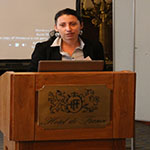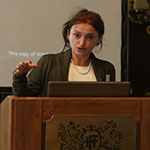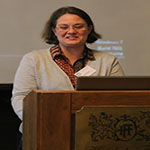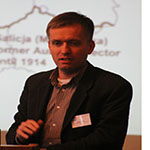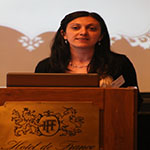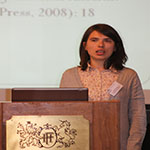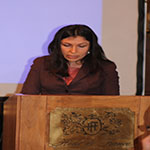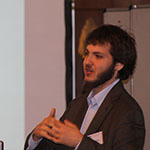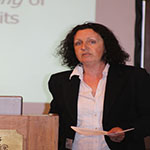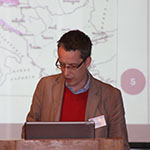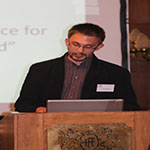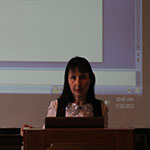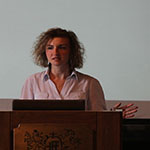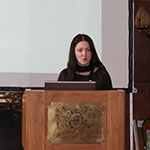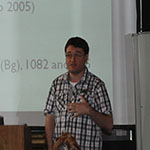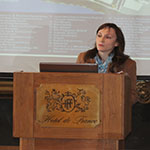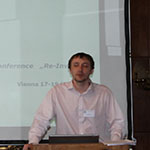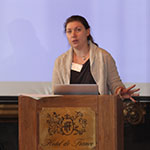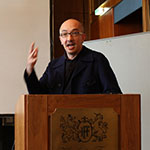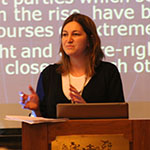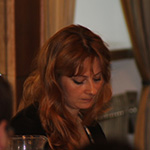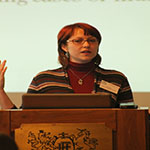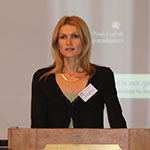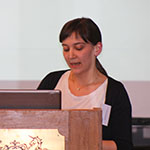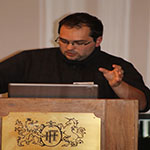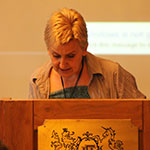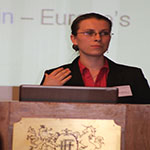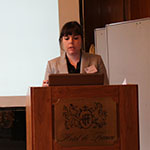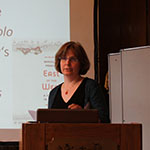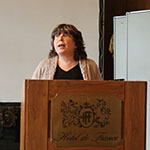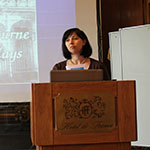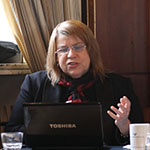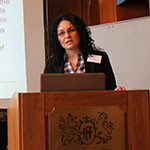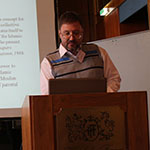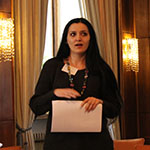Conference program
- May 17, 2012
- 13:00 - 13:30Registration (Reception Desk)
- 13:30 - 14:00Welcome and Opening Remarks
- 14:00 - 15:30Keynote Speech – Larry Wolff ( New York University) Re-Inventing Eastern Europe: Western Perspectives After the Cold War
- 15:30 - 16:00Coffee Break
- 16:00 - 18:00Panel 1– Post-Colonial Readings of Eastern Europe and Sharing Some Eastern Views (Chair Emanuel Crudu)
- 18:00 - 19:30Panel 2–Mental Mappings of Europe – East and West: From the Persistence of a Division to Peopling the Eastern Europeans (Chair: Ekaterina Bagreeva)
- 19:30 - 20:00Welcome Reception (Atrium)
- 20:00 - 21:30Dinner – Restaurant Hotel De France
- May 18, 2012
- 09:00 - 10:00Keynote Speech –Branislav Radeljic (University of East London) Europe and the Collapse of Yugoslavia: Existing and Potential Arguments
- 10:00 - 10:30Coffee Break
- 10:30 - 12:00Panel 3 – Ethnicity and its Contemporary Challenges in Eastern Europe (Chair: Sergiu Gherghina)
- 12:00 - 13:30Panel 4 – Religion and Modernity in Eastern Europe (Section one) (Chair: Martina Topić)
- 13:30 - 15:00Lunch – Restaurant Hotel De France
- 15:00 - 17:00Panel 5 – Eastern Europe and Asymmetries of Europeanization (Chair: Emanuel Crudu)
- 17:00 - 17:30Coffee Break
- 17:30 - 19:30Panel 6 – Europe’s Emerging New Others (Chair: Daniela Chalaniova)
- May 19, 2012
- 09:00 - 11:00Panel 7 – Representations of Eastern Europe in Anglophone Literatures (1990s – 2010s) (Chair: Ludmilla Kostova)
- 11:00 - 11:30Coffee Break
- 11:30 - 13:30Panel 8 – Religion and Modernity in Eastern Europe (Section two) (Chair: Martina Topić)
- 13:30 - 14:00Closing Session
- May 17, 2012
International Conference: Re-Inventing Eastern Europe

- Conference Description
- Participant’s Profile
- Registration and Fee
- Social Activities and Publication
- Important Dates
- Venue and Directions
- Panel 1
- Panel 2
- Panel 3
- Panel 4
- Panel 5
- Panel 6
- Panel 7
- Panel 8
Re-Inventing Eastern Europe
17 – 19 May 2012, Vienna
Hotel De France
Salon Franz Joseph
Keynote Speakers: Larry Wolff and Branislav Radeljic
Not a long time ago, in 2010, a British lady was considered bigoted by Gordon Brown upon asking ‘Where do all these Eastern Europeans come from?’(1). Maybe, despite her concern with the dangers of immigration for Britain, the lady was right in showing that such a question still awaits for answers in Europe. The ironic thing however is that a first answer to such a question would point to the fact that the Eastern Europeans come from the Western European imaginary. As Iver Neumann puts it, ‘regions are invented by political actors as a political programme, they are not simply waiting to be discovered’(2). And, as Larry Wolff skilfully showed, Eastern Europe is an invention emanated initially from the intellectual agendas of the elites of the Enlightenment that later found its peak of imaginary separation during the Cold War(3).
The Economist, explicitly considered Eastern Europe to be wrongly labelled and elaborated that ‘it was never a very coherent idea and it is becoming a damaging one’(4).The enlargement however was expected to make the East – West division obsolete under the veil of a prophesized convergence. That would have finally proven the non-otologic, historically contingent and unhappy nature of the division of Europe and remind Europeans of the wider size of their continent and the inclusive and empowering nature of their values. Yet still, 20 years after the revolutions in the Central and Eastern European countries, Leon Mark, while arguing that the category of Eastern Europe is outdated and misleading, bitterly asks a still relevant question: ‘will Europe ever give up the need to have an East?’(5)
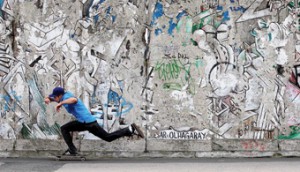
Eastern Europe was invented as a region and continues to be re-invented from outside and inside. From outside its invention was connected with alterity making processes, and, from inside the region, the Central and Eastern European countries got into a civilizational beauty contest themselves in search of drawing the most western profile: what’s Central Europe, what’s more Eastern, what’s more Ottoman, Balkan, Byzantine, who is the actual kidnapped kid of the West, who can build better credentials by pushing the Easterness to the next border. A wide variety of scholars addressed the western narratives of making the Eastern European other as an outcome of cultural politics of enlightenment, as an effect of EU’s need to delineate its borders, as an outcome of its views on security, or as a type of ‘orientalism’ or post-colonialism. Most of these types of approaches are still useful in analyzing the persistence of a East-West slope. The region is understood now under a process of convergence, socialization and Europeanization that will have as outcomes an ‘ever closer union’ where the East and the West will fade away as categories. Yet the reality is far from such an outcome while the persistence of categories of alterity making towards the ‘East’ is not always dismantled. The discourses on core/non-core, new Europe/old Europe, pioneers/followers, teachers/pupils, centre/periphery, cosmos/chaos are often maintaining significant ground within the arena of European identity narratives often yet not exclusively voiced by the EU.
The Euroacademia International Conference ‘Re-Inventing Eastern Europe’ aims rather than asserting to make a case and to provide alternative views on the dynamics, persistence and manifestations of the practices of alterity making that take place in Europe and broadly in the mental mappings of the world. It offers an opportunity for scholars, activists and practitioners to locate, discuss and debate the multiple dimensions in which specific narratives of alterity making towards Eastern Europe preserve their salience today in re-furbished and re-fashioned manners. The conference aims to look at the processes of alterity making as puzzles and to address the persistence of the East-West dichotomies.
(1) The exact question of Gillian Duffy to Gordon Brown was: “all these Eastern Europeans what are coming in, where are they flocking from?”. See the whole dialogue on BBC News online at http://news.bbc.co.uk/2/hi/uk_news/politics/election_2010/8649448.stm
(2) Neumann, Iver. 2001. Regionalism and Democratisation. In Jan Zielonka and Alex Pravda (eds.), Democratic Consolidation in Eastern Europe, Vol 2 International Dimensions. Oxford and New York: Oxford University Press, pp. 58 – 75, p. 71.
(3) Wolff, Larry. 1994. Inventing Eastern Europe. The Map of Civilization on the Mind of the Enlightenment. Stanford: Stanford University Press.
(4) The Economist, January 7th 2010, http://www.economist.com/node/15213108
(5) Marc, Leon. 2009. What’s So Eastern about Eastern Europe? Twenty Years After the Fall of The Berlin Wall. Trowbridge: Oldcastle Books, p.161.
The conference is addressed to academics, researchers and professionals with a particular interest in Central and Eastern Europe from all parts of the world. As the nature of the conference is intended to be multidisciplinary in nature different academic backgrounds are welcomed.
Post-graduate students, doctoral candidates and young researchers are welcomed to submit an abstract. Representatives of INGOs, NGOs, Think Tanks and activists willing to present their work with impact on or influenced by specific understandings of the Central and Eastern Europe are welcomed as well to submit the abstract of their contribution.
Abstracts are reviewed and the participants are selected based on the proven quality of the abstract. The submitted paper for the conference proceedings is expected to be in accordance with the lines provided in the submitted abstract.
Participation fee: 180 Euro
The participation fee includes:
- the registration fee,
- all the materials for the conference
- a copy of the electronic volume
- access to Euroacademia discussion group and newsletters
- discounted rates for participation in the future Euroacademia conferences
- coffee brakes with snacks for all the duration of the conference
- wine reception and a cocktail with buffet dinner for 17 May 2012 – the opening day
- a 3 course lunch on 18 May 2012
- certificate of attendance
- optional social program.
A registration form will be sent to accepted participants that must be filled in and sent to [email protected] until 1st of April 2012 and until the 10th of April the payment of the participation fee through bank transfer is requested and considered as the final confirmation of attendance. No paper will be introduced in the program without confirmation and payment of the participant fee.
Please be aware that the final confirmation of attendance will be considered upon payment of the participation fee in the Euroacademia account:
Euroacademia
Credit Mutuel
IBAN: FR7610278060470002073210155
BIC: CMCIFR2A
PARIS 17 ETOILE – 30 AVENUE NIEL 75017 PARIS FRANCE
The participation fee can be paid through bank transfer. A confirmation of receipt will be sent to you by e-mail and the original invoice will be delivered to you on site at the conference.
Unfortunately, Euroacademia has no available funds for covering transport and accommodation in Vienna. Participants are responsible for finding funding to cover transportation and accommodation costs during the whole period of the conference. Official letters can be sent by Euroacademia to the financing institution to confirm the selection and participation in the conference upon request.
A specific spot in the conference program will be dedicated to social networking and therefore all the participants interested in setting or developing further cooperation agendas and prospects with other participants will have time to present and/or promote their project and express calls for cooperation.
A specific setting (Social Corner) for promotional materials connected with the topic of the conference will be reserved for the use of the participants. Books authored or edited by the participants can be exhibited and promoted during the whole period of the conference and can also be presented within the conference package based on prior arrangements.
An optional dinner and a social event will be organized for the second evening of the conference on a boat on the Danube river as optional program for the willing participants. The social dinner will be held based on participant’s confirmation and it costs 50 Euro to be covered by participants.
Publication:
Selected papers will be published in an electronic volume with ISBN after the confirmation of the authors and a double peer-review process based on an agreed publication schedule. All the papers selected for publication should be original and must have not been priory published elsewhere. All participants to the conference will receive a copy of the volume.
Specific selected papers will be selected to be published in CEJISS (Central European Journal of International & Security Studies)
About CEJISS
Formally launched in January 2007, CEJISS is designed as a double-destination scholarly bridge. The first bridge was constructed with Central Europe (Czech Republic, Hungary, Poland and Slovakia) in mind, focusing on increasing the audience for Central European scholars. In this regard, CEJISS is making a substantial impact as each issue attracts attention in some 45,000 people in nearly 160 countries. However, CEJISS is not Central European centric and invites scholars from around the world to contribute. This has meant that just as Central European scholars now have an easier time gaining a footing outside of the region, so international scholars also have an easier time getting in and making an impact here. With a mere two decades separating our times from the ‘darker’ Cold War years, CEJISS aims to contribute English language perspectives to the peoples of Central Europe and give the latter the amplification their research deserves.
Specific selected papers will be also eligible for selection and published in East European Politics
| Important Dates | |
|---|---|
| 30 February 2012 | Deadline for Submitting Panel Proposals |
| 20 March 2012 | 300 words abstracts and details of affiliation |
| 25 March 2012 | Notification of acceptance |
| 1st of April 2012 | Sending the participation form |
| 10th of April 2012 | Payment of the conference fee |
| 1st of May 2012 | Sending the draft paper to be uploaded on the web site of the conference |
| 5th of May 2012 | Publication of the conference program and uploading the draft papers on the website |
| 17th of May 2012 | The conference commences |
The conference will take place in the events premises of the exclusive 5 stars Hotel de France, centrally located in the heart of Vienna and easily accessible from the historic area of the beautiful imperial town. It is located near the Stephans Dome, in the heart of the shopping and banking district of Vienna.

1010 Vienna, Schottenring 3
Tel.: +43 1 31 368 – 0

Vienna is a wonderful town with a rich history and a live full of cultural events.
For full information on Vienna as travel destination see the Vienna Destination Guide 2012: here
Post-Colonial Readings of Eastern Europe and Sharing Some Eastern Views
(Chair Emanuel Crudu, IMT Institute for Advanced Studies, Italy)
- Eastern Europe as an Anthropological Construct. Hierarchies of Knowledge and Power in the Foundation of East European EthnologyThe paper looks at the ways Eastern Europe is described in Western anthropological literature. It is visible that so-called ‘native anthropologists’ almost do not exist in Western works and give the power of their representation to Western colleagues.Karolina Koziura, Institute of Cultural Studies, Maria Curie-Sklodowska University in Lublin, Poland
- Uncovering Romania by Geography. A Study on How Geography in Romania Cultivated Lands and RomaniansThis paper primarily seeks to question how Romanian geography became a science with which to cultivate both lands and people.Cosmina Paul, National School of Political and Administrative Studies, Bucharest, Romania
- The Romanian Avant-garde – Eastern Modernity With (a) Western Touch(es)The present study aims to discuss some of the intricate relationships established between the Romanian avant-garde artists and their Western counterparts, in the wider context of Romania’s sociopolitical and cultural modernization.Ana-Maria Stan, Babes-Bolyai University, Cluj-Napoca, Romania
- Eastern Poland and its “Eastern” Aspects of Regional IdentityThe paper will discuss the ways the stigma of the Eastern Europe functions and is dealt with on a regional level. The specific case study will be Eastern Poland and its regional identity discourses.Tomasz Zarycki, University of Warsaw, Institute for Social Studies, Poland
- The Western Imaginary and the Imagined Strategies Against It in the Eastern European Countries and the Margins of Eastern EuropeThe following paper discusses how the Western imaginary or the way “the West looks East” reinforces the construction of “unstable” or ambivalent identities in the Eastern European countries, as well as the margins of Eastern Europe.Lia Tsuladze, Tbilisi State University, Georgia
- A Very Reserved Westernism: Ukrainian National Project in Late Russian EmpireThe proximity of Ukrainian and Russian national projects, as well as convoluted relations between them show a particularly interesting case of East/West discourse analysis.Olha Martynyuk, National Technical University of Ukraine “Kiev Politechnic Institute” and Institut für die Wissenschaftenvom Menschen, Austria
Mental Mappings of Europe – East and West: From the Persistence of a Division to Peopling the Eastern Europeans
(Chair Ekaterina Bagreeva, Russian Economic University of G. V. Plekhanov, Moscow, Russia)
- East – West Reflections On the Shared ValuesThe paper aims at examining the specificities of the process of consolidation of the EU citizens around certain European values. It is thematically developed in three parts. The point of departure of the first chapter is the understanding that the long lasting process of European consolidation has been historically shaped around certain contradictions - between Europe and Asia, Christianity and Islam, East and West.Liliya Sazonova, Institute for the Study of Societies and Knowledge, Bulgarian Academy of Sciences
- The Political Language of Moral Panics: Teutophobia and the Image of a Besieged Romania in 1871The paper seeks to examine the political vocabulary employed by anti-conservative Romanian journalists who, in the wake of the Prussian victory of 1871, attempted to forge – through fear and suspicion – a greater sense of solidarity among their readers, playing sympathy and loathing toward Western cultural influences against each other, imagining and constructing 'the nation' as a moral community.Andrei Dan Sorescu, Faculty of Political Science, Bucharest University, Romania
- Exploring the Basic Values Maps of West and East Germany, Czech Republic, and Poland – Findings and Explanations From a Research of Personal AdvertisementsThe content analysis of personal ads from West and East Germany, the Czech Republic and Poland allowed the ascertainment of basic values and attitudes towards life and partnership. These values and attitudes represented in the personals enabled us to reconstruct for each of the examined cultures a particular concept of life and partnership. We intended to find out, why there is in a culture a particular value-formation and no other.Ulrike Notarp, Internationales Hochschulinstitut Zittau, Germany
- Eastern, Central, or East-Central Europe? Identity Dilemmas in Contemporary PolandFirstly, the objective of this paper is to show in what manner Central and East-Central Europe is perceived in Poland, secondly – to point at cultural and historical background and socio-political meaning of particular ideas. Since all these notions are casual and conditioned both politically and historically, and they also correspond with affairs of certain political, business and academic groups.Adam F. Kola, Institute of Slavonic Philology, Nicolaus Copernicus University, Toruń, Poland
- Outside the StadiumThe main aim of this paper is to discuss the views and opinions on Euro 2012 articulated in Polish media. Taking into account bitter notions represented by many journalists concerning Polish development disabilities one can conclude there is terrifying lack of self-confidence among Poles.Michal Krajkowski, Nicolaus Copernicus University, Torun, Poland
Ethnicity and its Contemporary Challenges in Eastern Europe
(Chair Sergiu Gherghina, GESIS Cologne, Germany)
- Ethnic Rights and National Personal Autonomy Under IntegrationThe key goal of this presentation is to present the possibility of new approach to ethnic question on the base of adapted historical experience in order to initiate the discussion on the matter. This approach proceeds from European theoretical and practical heritage. Precisely, it is a question of the concept called “National Personal Autonomy” produced by Austrian School of non-territorial federalism.Alla Kovalova, Luhansk Regional Women’s Legal Defence Public Organization “Chaika”, Ukraine
- The Post-Accommodation Stages of Ethnic Relations: Political Structures and Actors as Challenges to Achieving Policy GoalsUsing critical discourse analysis and document analysis, the paper look in particular at post-communist Romania and engages in three analytical steps: first, it reviews the key minority claims expressed during the past twenty years and their time sequence; second, it analyzes how political actors have framed minority integration (by identifying key patterns of discourse, and investigating legislative-institutional developments).Monica Andriescu, University of Bucharest, Romania
- Elite-level Use of Ethnic Categories in Post-Socialist SlovakiaThis paper is a single-study of post-socialist ethnic identification in today’s Slovakia rooted in post-Barthian approach to ethnicity. It deals with the ways in which ethnic categories, ethnic symbolism and ethnic interpretations were used in elite-level political mobilization during the 2012 electoral campaign focusing on the victorious party SMER-SD.Petra Burzova, Department of Politics and International Relations, Faculty of Philosophy and Arts, University of West Bohemia, Czech Republic
- Inter-ethnic Relations in the Republic of Macedonia as a Priority or Deficiencies in the Process of Building Democratic InstitutionsAfter the dissolution of former Yugoslavia and the changes in the economic and political system in Republic of Macedonia, a new democratic system should be established based on equal ethnic and cultural rights, where the human rights and their freedom, as well as the rights of ethnic groups would be respected.Fadil Zendeli, Faculty of Public Administration and Political Sciences, South East European University, Tetovo, Macedonia
- How Different? The Political Participation of Ethnic Minorities in Eastern EuropeThis paper seeks to address this gap in the literature by answering two research questions: how does the political participation differ in the case of ethnic minorities (compared to the majority population) and what factors enhance it? The study is carried at individual level using data from the Candidate Study of Electoral Systems (CSES). It includes three Eastern European countries with relevant ethnic minorities (i.e. relevance according to several criteria) and provides a cross-national analysis.Sergiu Gherghina, GESIS Leibniz Institute for the Social Sciences, Cologne, Germany
Religion and Modernity in Eastern Europe (Section one)
(Chair Martina Topić, Faculty of Political Science, Sociology Unit, University of Zagreb, Croatia)
- The Shrine in Licheń: Redefining Religiosity and EntertainmentWhile the Polish Church played an undeniably significant role in overthrowing Communist rule, it, too, has been forced to rethink its role in post-1989 Poland. Thus, an example of this change can be found in a brand new shrine built in a small town, Licheń in 2004.Helena Chmielewska-Szlajfer, New School for Social Research, New York and Institute of Applied Social Sciences, University of Warsaw, Poland
- Czech Modernity As Secular ModernityIn my paper, I would like to suggest how the conceptual framework of multiple secularities inspired by Shmuel Eisenstadt and elaborated by a German sociologist Monika Wohlrab-Sahr can help us in our efforts to understand the Czech case.Roman Vido, Masaryk University, Brno, Czech Republic
- Serbian Orthodox Church and the Challenge of Modernity, 1900-1945I argue that the Serbian (and later interwar Yugoslav) as well as broader European political context was of great significance for the development of the Serbian Orthodox political project, which indeed in the shape that it acquired by the late 1930s was closely linked to nationalism.Maria Falina, Central European University, Budapest, Hungary
- Western Confessionalization of Eastern Europe as Practiced in the Former YugoslaviaI will demonstrate how many policies and interventions of the European Union and other “Western” political, educational, humanitarian and media agencies, putatively termed confessionalization (Reinhard and Schilling), contributed to the petrification of confessional segmentation and buttressed conservative political attitudes of religious leaders and institutions.Bojan Aleksov, The School of Slavonic and East European Studies, University College London, UK
Eastern Europe and Asymmetries of Europeanization
(Chair Emanuel Crudu, IMT Institute for Advanced Studies, Italy)
- The Dynamics of Eastern Europeanization and the Impact of ‘Membership Credibility’ in Enlargement Rounds ComparedThis article will assess to what extent the new and previous potential candidate countries from Eastern Europe have been able to bring their policies and institutions – both in formal and practical terms – in line with the EU requirements.Dorian Jano, Department of Governance, Politics and Communication; and Research Fellow, Albanian Institute for Public Affairs, Marin Barleti University, Tirana, Albania
- Rise of Extreme Right in Europe: New ‘Other’s of Europe and The Question of Turkey’s Membership to the EUIn this article Germany who is a founder member of the EU, one of the most influential countries in the enlargement policy of the EU and who has the largest number of Turkish immigrants will be focused on.Selcen Öner, Bahçeşehir University, İstanbul, Turkey
- Dark Age of Economics of Transition: The Case of Bosnia & Herzegovina’s Economic TransitionIn this paper we analyze the Economic development strategy of the international institutions imposed on B&H from the point of view: how an economic idea may be counterproductive: economically, politically, and socially.Dragoljub Stojanov, Department of Economics, University of Rijeka, Croatia
- West versus East – A Question of TrustReinventing Eastern Europe, the question of trust between East and West must once again be defined – especially in the context of businesses. The importance of trust in business was underlined by the Nobel Laureate in economics, D. Akerlof, who introduced the term: Confidence multiplier.George Yuryev and Ekaterina Bagreeva , Institute of Philosophy of the Russian Academy of Sciences and The Russian Economic University of G. V. Plekhanov, Moscow
- Is There an Eastern Capitalism? Convergence or Divergence in Eastern EuropeThis paper uses the varieties of capitalism approach to explore the institutional infrastructure of the emergent post-communist capitalisms. It looks into property rights, welfare, market, and political economy institutions as dimensions against which to assess the emergent models of post-communist capitalisms.Aura Matei, University of Bucharest and Center for Institutional Analysis and Development Eleutheria, Bucharest, Romania
Europe’s Emerging New Others
(Chair Daniela Chalaniova, Metropolitan University Prague, Czech Republic)
- EU vs Western Balkans: Life on the Margins of a Great CommunitySymbolically marked by the fall of the Berlin Wall in 1989. the end of the cold war meant the new historic era of union and prosperity of West European people. At the same time, the rest of Europe was in front of historic temptation of radical political and economic and systematic changes.Ivana Božić Miljković, Faculty of Law and Business Studies Dr Lazar Vrkatić, Novi Sad, Serbia
- I am Georgian, and therefore I am European” – Re-searching the Europeanness of GeorgiaDespite their remarkable enthusiasm for the EU, national identity remains more profound for Georgians than a European identity.Natia Mestvirishvili, The Caucasus Research Resourse Centers, Georgia
- Enemy Within: Constructing Social Exclusion in the Czech Media, 2010-2011We would like to analyze the interpretative frames imposed by the mass media in the Czech Republic during the years 2010 and 2011.Jan Paul and Lubomír Lupták, University of West Bohemia, Czech Republic
- The Europeanization of Balkans: Yes or No!?The controversy revolving around the expansion of the Union, seems to be treated throughout the content of the media, which, in front of the domestic and international audience, channelizes the European public opinion.Liljana Siljanovska, South East European University, Tetovo
- EU – U.S. Counter-terrorist Cooperation and the Impact of Disputed Cases as the U.S. – EU SWIFT Accord, Passenger Name Record (PNR) Data and EU – U.S. AgreementsMy presentation is going to analyze disputed cases, which divided these sides on “us” and “them”. These different approaches toward security conceptions evoked debates about values and principles of EU and the USA.Klára Medunová, Metropolitan University, Prague, Czech Republic
- Turn the Other Greek. How the Eurozone Crisis Changes the Media Image of Greeks and What do the Visual Representations of Greeks Tell Us About European Identity?This paper analyzes discursive practices of political cartoons in construction of Greek and European identity in light of the European sovereign debt crisis.Daniela Chalaniova
Representations of Eastern Europe in Anglophone Literatures (1990s – 2010s)
(Chair Ludmilla Kostova, University of Veliko Turnovo, Bulgaria)
- Against Assimilatory Forgetting: Memory as Identity in Contemporary Fiction on Migration from Eastern EuropeI am going to investigate how the narrative strategies in both the novels revolve around memory as a trigger for a new definition of identity based on transition rather than on the identification with national groups.Giulia Da Lio, Stockholm University, Sweden
- Loss of Home and Loathing Nostalgia in the English Writings of Central and Eastern European ExilesThe presentation investigates this tension by reading writers who have published books about both their former home countries and their new English speaking environments.Christoph Houswitschka, Bamberg University, Germany
- “I would be nothing without you”: Survival and Failure in Rana Dasgupta’s Solo and Miroslav Penkov’s East of the WestI am going to explore how the two texts (Rana Dasgupta’s novel Solo and Miroslav Penkov’s story collection East of the West) develop the notions of failure and survival not only to represent their Bulgarian protagonists or to come to terms with Bulgaria’s past.Anja Müller, Siegen University, Germany
- “East of the West: A Country in Stories”: The Interplay of Identity and Exoticism in the Short Stories of Miroslav PenkovThis essay focuses upon a set of questions that arise from the subtitle of MiroslavPenkov’s collection of short stories, East of the West: A Country in Stories (2011): what does it mean to claim that ‘a country’ can be found in a collection of stories?Brenda Tooley, Monmouth College, IL, USA
- Atypical Memoirs in English by Eastern European Female WritersEva Hoffman, Vesna Goldsworthy, and Irina Pana are but a few of the female immigrant writers whose literary border crossings and transnational appropriations I intertextually explore in my project.Corina Crisu, University of Bucharest, Romania
- Gothic Plots and Political Anxieties: Kapka Kassabova’s Reconnaissance and Elizabeth Kostova’s The HistorianMy presentation focuses on two novels, Reconnaissance (1999), by Bulgarian-born writer and poet Kapka Kassabova, and The Historian (2005), by US-American writer Elizabeth Kostova.Ludmilla Kostova, University of Veliko Turnovo, Bulgaria
Religion and Modernity in Eastern Europe (Section two)
(Chair Martina Topić, Faculty of Political Science, Sociology Unit, University of Zagreb, Croatia)
- Myth — A Dream — Memories — A Discovery: C. G. Jung’s Case – P. Florensky’s CaseIn the case with the Russian scientist Pavel Florensky and the German theorist of psycho-analysis Carl Gustav Jung attractors are mystic dreams, forming primary matrix of personality — a self repeating fractal, identically showing up also in the structure of a person, and in his/her scientific creative process and creative product — regardless of national, cultural, social or another belonging of personality.Olena Kryvopyshyna, Sumy State University, Ukraine
- “Who Could Challenge Democracy? ” The Law on Religious Freedom – An Expression of Romanian Democracy?The proposed paper aims to analyze the place of religion in Romanian society and politics, by focusing specifically on the process of readjusting religious freedom in Romania after 1990.Natalia Vlas, Centre for Political Analysis, Babes-Bolyai University, Cluj-Napoca, Romania
- Reinventing Islamic “Tradition” in Crimea: Ethnicity, Religion, PoliticsThe purpose of this presentation is twofold. Firstly, it aims at in-depth study of contemporary Islamic revival in Crimea in the context of identity politics. Secondly, we will present a comparative analysis of the formation of an "Islamic locality" in the Crimea and the development of Muslim diasporas and the" translocal Umma" in Western Europe.Oleg Yarosh, National Academy of Science, Kiev, Ukraine
- Religion and the Education System in Croatia: A Multiple Modernities ViewThe questions this paper is analyzing are: what is the politics of Croatian authorities in the education system, what reception this politics receive in the society and what are the implications for the future and the common European project.Martina Topić, Faculty of Political Science, Sociology Unit, University of Zagreb, Croatia
- Christianity, Modernity and Romanian FolkloreThe Romanian space underwent the modernization process at a later stage as compared to other regions from Europe, and Romanian elites, eager to catch up with the “civilised” Europe, stimulated the phenomenon known as “stage burning” in Romanian historiography.George Enache, Faculty of History, Philosophy and Theology, “Dunarea de Jos” University of Galati, Romania















